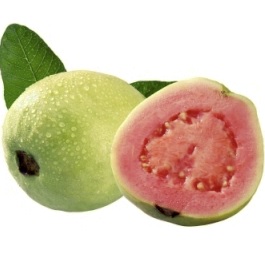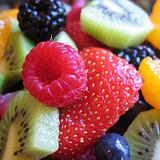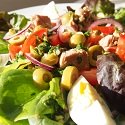Guava Nutrition Facts,
Health Benefits of Guava
All about guava nutrition facts, guava benefits, nutritional benefits of guava, guava nutrients, calories in a guava
There are a number of varieties of guava, having variations in size and color, with the flesh ranging from a creamy white to a salmon red, and the shape either round or oval, similar to a pear.
As with most fruit, the guava is very low in calories, approx. 68 calories per serving (100g or 3.5oz), contains no cholesterol and is very low in fat, so is an ideal fruit to include in your weight loss diet.
The guava is packed with antioxidants. Just look at the vitamin C content in the table below, providing nearly four times the recommended daily intake (RDI). In addition the fruit provides a good source of vitamins B9 (folate) and A, is high in both protein and fiber, and provides a modest source of minerals, especially potassium, copper and manganese. The pink guava is also high in lycopene.
All of these vitamins and minerals combined provide a very nutritious fruit with a lot of health benefits. The fruit is believed to help to regulate our blood pressure, reduce the incidence of heart disease, inhibit growth of cancer cells, provide us with good digestion and lower cholesterol.
When purchased the fruit does not remain at peak condition for long, so eat as quickly as possible as it will start to deteriorate after about two days.
Compare guava nutrition facts to the other fruits.

Guava Nutrition Information
| Guava nutrition facts per 100 g (3.5 oz) Refuse: 22% (Skin) Scientific Name: Psidium guajava |
|
|---|---|
| Proximates: | |
| Water | 80.80 g |
| Energy | 285 kJ (68 kcal) |
| Protein | 2.55 g |
| Carbohydrates | 14.32 g |
| Total Fat: | 0.95 g |
| Fiber | 5.4 g |
| Cholesterol | 0 mg |
| Minerals: | |
| Calcium, Ca | 18 mg (2 %) |
| Iron, Fe | 0.26 mg (1 %) |
| Magnesium, Mg | 22 mg (6 %) |
| Phosphorus, P | 40 mg (4 %) |
| Potassium, K | 417 mg (9 %) |
| Sodium, Na | 2 mg (0.1 %) |
| Zinc, Zn | 0.23 mg (1.5 %) |
| Copper, Cu | 0.230 mg (12 %) |
| Manganese, Mn | 0.150 mg (8 %) |
| Selenium, Se | 0.6 mcg (1 %) |
| Vitamins: | |
| Vitamin C | 228.3 mg (381 %) |
| Thiamine (Vit. B1) | 0.067 mg (4 %) |
| Riboflavin (Vit. B2) | 0.040 mg (2 %) |
| Niacin (Vit. B3) | 1.084 mg (5 %) |
| Pantothenic acid (B5) | 0.451 mg (5 %) |
| Vitamin B6 | 0.110 mg (6 %) |
| Folate (Vit. B9) | 49 mcg (12 %) |
| Vitamin A | 624 IU (12 %) |
| Vitamin E | 0.73 mg (4 %) |
| Vitamin K | 2.6 mcg (3 %) |
| Percentages are relative to US Recommended Daily Intake (RDI) for adults. | |
Author: Lana Soko
You Might Also Like:
Like This Page?
|
Share This Page:
|







